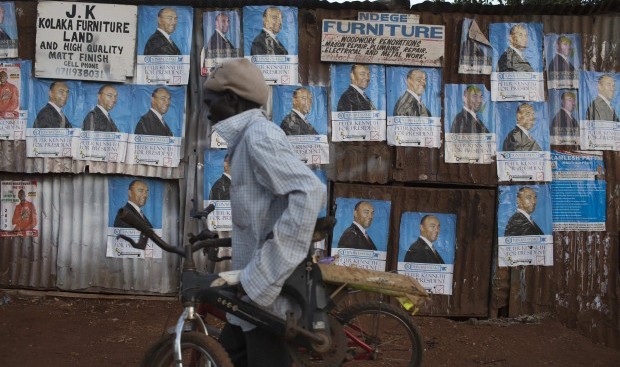
A cyclist moves past campaign posters of Kenya’s presidential candidate Peter Kenneth at the Kangemi slum in Kenya’s capital Nairobi February 28, 2013. (REUTERS/Siegfried Modola)
LONDON, Asharq Al-Awsat—The presidential elections due to take place this Monday in Kenya are raising fears of yet another wave of ethnic violence. A related worrying development is the formation of local armed militias supported by local political leaders.
Over the last few days, local media reports on vote-buying have fed into the idea that the outcome of these elections will be a gloomy one.
The previous elections, held in December 2007, were marked by widespread violence after President Mwai Kibaki of the Kikuyu tribe was declared the winner following mutual accusations of electoral irregularities between Kibaki’s party and the main opposition party, the Orange Democratic Movement. These irregularities were confirmed by international observers.
Speaking to Asharq Al-Awsat, Dr. Steve Itugbu, a Kenya expert and fellow at the School of Oriental and African Studies in London, said that in Kenya as in many other African countries, violence or the threat of violence typically surround “the preparation period for elections, the elections, and the post-election squabbles over disputed results.” Dr. Itubgu added that despite “the rumors of arms being stockpiled and the rhetoric along tribal and sectarian lines, there are grounds to believe all the parties to the last dispute have learned their lessons.”
As Dr. Itugbu explained, former UN Secretary-General Kofi Annan and the African Union held a series of constructive meetings with various Kenyan groups including the government, opposition, business figures, and religious leaders, in order to avoid past mistakes over electoral disputes.
Kenya is characterized by a very complex tribal and ethnic mosaic. The three biggest tribes are the Kikuyu, Luo, and Akamba, which together make up about 40 percent of the population.
The Eastern African country is also home to Arab communities. Since the 1st century AD traders from southern Arabia settled along the East coast of Africa. The Kilwa Sultanate, in modern-day Tanzania, ruled over the entire Swahili Coast. During this time important port-cities were built by the Arabs, including Mombasa (Kenya) and Zanzibar (Tanzania). There are an estimated 4.3 million Muslims in Kenya, the majority of whom are Sunni.
Kenya is an important regional hub. Nairobi is home to one of the four major United Nations offices. Although half of Kenyans live in abject poverty, Kenya’s is still East Africa’s biggest economy. Tourism represents the key sector of the country’s service industry, and there are widespread concerns that a repetition of the violence of the previous election might send tourists elsewhere.
One of the most brutal acts of the 2007-2008 Kenyan crisis was the killing of 30 civilians in a church on New Year’s day. Violent protests were particularly intense close to the homeland of opposition leader Raila Odinga. In the huge Nairobi slums, the ensuing chaos saw ethnically-motivated attacks taking place simultaneously with the actions of criminal gangs. The Kenyan police and security forces responded by shooting a number of protesters.
Overall, 1,133 people died and 600,000 were displaced from their homes during the 2007-2008 electoral crisis. The violence only came to an end after a round of negotiations mediated by former UN Secretary-General Kofi Annan. The outcome of these negotiations was a power-sharing agreement between Kibaki and Odinga; the latter becoming prime minister.
A number of Kenyan politicians were indicted by the International Criminal Court (ICC) following the 2007-2008 violence for crimes against humanity. Among those indicted was Uhuru Kenyatta, one of the main contenders in Monday’s election. Also indicted by the ICC was Kenyatta’s running mate, William Ruto.
According to Dr. Itugbu, “the race is too close to call, but one should acknowledge this duo for coming this far in a race already conceded to Raila Odinga by the international community.”
